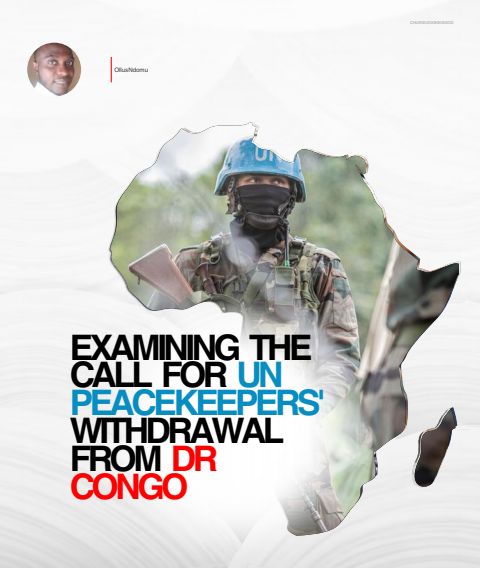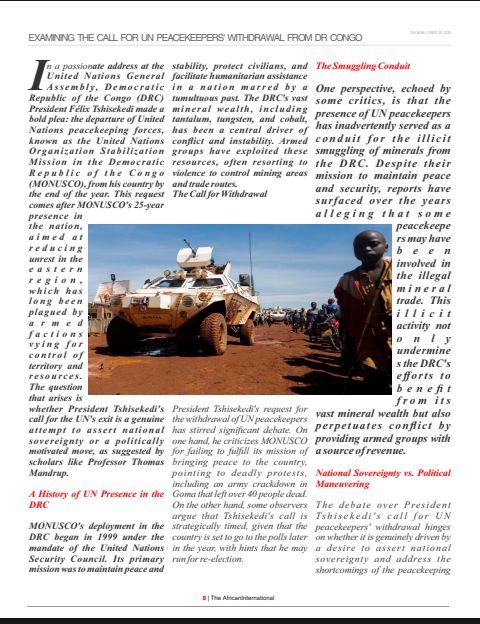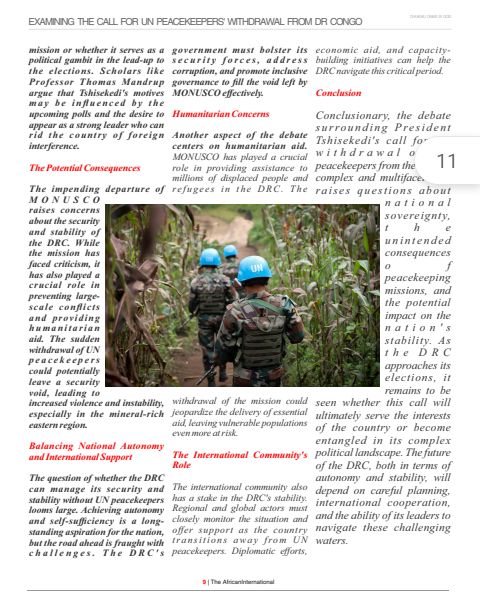Ndhomu Ollus

In a passionate address at the United Nations General Assembly, Democratic Republic of the Congo (DRC) President Félix Tshisekedi made a bold plea: the departure of United Nations peacekeeping forces, known as the United Nations Organization Stabilization Mission in the Democratic Republic of the Congo (MONUSCO), from his country by the end of the year. This request comes after MONUSCO’s 25-year presence in the nation, aimed at reducing unrest in the eastern region, which has long been plagued by armed factions vying for control of territory and resources. The question that arises is whether President Tshisekedi’s call for the UN’s exit is a genuine attempt to assert national sovereignty or a politically motivated move, as suggested by scholars like Professor Thomas Mandrup.

A History of UN Presence in the DRC
MONUSCO’s deployment in the DRC began in 1999 under the mandate of the United Nations Security Council. Its primary mission was to maintain peace and stability, protect civilians, and facilitate humanitarian assistance in a nation marred by a tumultuous past. The DRC’s vast mineral wealth, including tantalum, tungsten, and cobalt, has been a central driver of conflict and instability. Armed groups have exploited these resources, often resorting to violence to control mining areas and trade routes.
The Call for Withdrawal
President Tshisekedi’s request for the withdrawal of UN peacekeepers has stirred significant debate. On one hand, he criticizes MONUSCO for failing to fulfill its mission of bringing peace to the country, pointing to deadly protests, including an army crackdown in Goma that left over 40 people dead. On the other hand, some observers argue that Tshisekedi’s call is strategically timed, given that the country is set to go to the polls later in the year, with hints that he may run for re-election.
The Smuggling Conduit
One perspective, echoed by some critics, is that the presence of UN peacekeepers has inadvertently served as a conduit for the illicit smuggling of minerals from the DRC. Despite their mission to maintain peace and security, reports have surfaced over the years alleging that some peacekeepers may have been involved in the illegal mineral trade. This illicit activity not only undermines the DRC’s efforts to benefit from its vast mineral wealth but also perpetuates conflict by providing armed groups with a source of revenue.
National Sovereignty vs. Political Maneuvering
The debate over President Tshisekedi’s call for UN peacekeepers’ withdrawal hinges on whether it is genuinely driven by a desire to assert national sovereignty and address the shortcomings of the peacekeeping mission or whether it serves as a political gambit in the lead-up to the elections. Scholars like Professor Thomas Mandrup argue that Tshisekedi’s motives may be influenced by the upcoming polls and the desire to appear as a strong leader who can rid the country of foreign interference.

The Potential Consequences
The impending departure of MONUSCO raises concerns about the security and stability of the DRC. While the mission has faced criticism, it has also played a crucial role in preventing large-scale conflicts and providing humanitarian aid. The sudden withdrawal of UN peacekeepers could potentially leave a security void, leading to increased violence and instability, especially in the mineral-rich eastern region.
Balancing National Autonomy and International Support
The question of whether the DRC can manage its security and stability without UN peacekeepers looms large. Achieving autonomy and self-sufficiency is a long-standing aspiration for the nation, but the road ahead is fraught with challenges. The DRC’s government must bolster its security forces, address corruption, and promote inclusive governance to fill the void left by MONUSCO effectively.
Humanitarian Concerns
Another aspect of the debate centers on humanitarian aid. MONUSCO has played a crucial role in providing assistance to millions of displaced people and refugees in the DRC. The withdrawal of the mission could jeopardize the delivery of essential aid, leaving vulnerable populations even more at risk.
The International Community’s Role
The international community also has a stake in the DRC’s stability. Regional and global actors must closely monitor the situation and offer support as the country transitions away from UN peacekeepers. Diplomatic efforts, economic aid, and capacity-building initiatives can help the DRC navigate this critical period.
Conclusion
Conclusionary, the debate surrounding President Tshisekedi’s call for the withdrawal of UN peacekeepers from the DRC is complex and multifaceted. It raises questions about national sovereignty, the unintended consequences of peacekeeping missions, and the potential impact on the nation’s stability. As the DRC approaches its elections, it remains to be seen whether this call will ultimately serve the interests of the country or become entangled in its complex political landscape. The future of the DRC, both in terms of autonomy and stability, will depend on careful planning, international cooperation, and the ability of its leaders to navigate these challenging waters.

